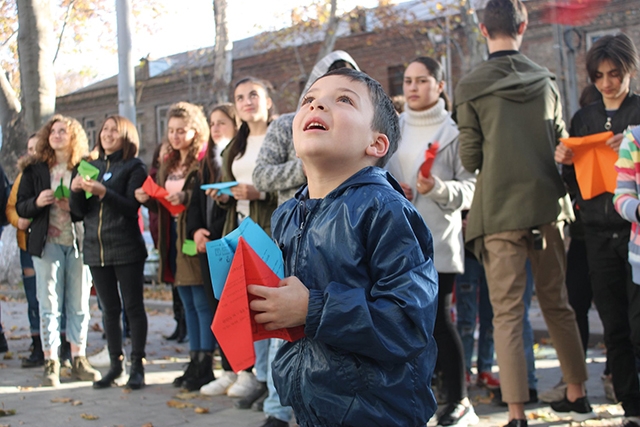USAID’s Civil Society Partners Building Brighter Futures for Children
Mariam beams with youthful confidence. “I’m going to be a lawyer. I’m going to work on children’s rights,” she announced. A 16-year-old public school student in Gori, Mariam sees a bright future for herself. She also feels a keen sense of responsibility, planning to dedicate her future to helping others.
In contrast, many children – not only in Georgia but all over the world – don’t look forward to a bright future. Instead of being nurtured into confident young adults, many kids are left to face challenges largely on their own. Poverty and neglect are global problems, and Georgia is no exception. In the worst cases, children become victims of violence. According to a UNICEF study, more than half of Georgians believe that physical discipline is an acceptable method of parenting.
“There is really a big problem with children’s rights. Many of them are victims of violence as well as bullying,” Mariam explained. To help change things for the better, she volunteers with a Gori-based civil society organization called Society Biliki (“pathway” in Georgian). Biliki has advocated for local children since 1997, operating shelters for at-risk kids and families, providing education, and lobbying for more investment in children’s services.
When we met Mariam, she was volunteering with “You’ve Got a Message,” a campaign to raise awareness about violence against children. In Gori, Society Biliki and other local organizations took action to reach a broad audience, including parents, teachers, and public officials.
Local organizations hosted monologues and artistic renditions to demonstrate how children are negatively affected by violence. They moderated public discussions with youth, parents, teachers, and school administrators about the quality of pre-school education. They collected signatures for a petition to present to local and national government.
The petition was drafted by the Coalition for Children and Youth, a network of 49 civil society organizations from communities around the country. It calls for increased investment in pre-school education, more training for childcare workers, improved methods for identifying and responding to violence against children, support services for children and families, and more effective policies to combat poverty.
The “You’ve Got a Message” campaign received financial and technical assistance from USAID’s ACCESS program, a nationwide initiative that helps civil society organizations build connections in local communities. By building capacity and supporting outreach, the program enables community organizations to more effectively impact policy to represent the interests of local citizens.
Lela Mindiashvili, a Biliki representative coordinating activities on the ground in Gori, told us about her organization’s efforts. “The most important thing is that our messages are directed at different parts of society,” Lela said. “It’s not only targeted to children, but to teenagers and also parents, teachers, media, government, and all different groups in society.”
While Lela and Mariam were hard at work in Gori, parallel events took place in Kutaisi and Telavi. The broader campaign was coordinated by the Coalition for Children and Youth. At the local level, Gori University and others offered up venue space and technical support. Other partners included Save the Children, the Civil Development Agency, the USAID-supported Network of Centers for Civic Engagement, and youth groups sponsored by USAID’s Promoting Integration Tolerance and Awareness Program.
Keti Kalandadze, one of the coalition’s leaders, highlighted that the campaign was both focused on local communities and national in scope: “There were two addressees, one was the local municipality and the second was the Georgian central administration,” she said. “There are different things that can be done nationally and locally.”
While the activities lasted three days, signs point to it making a lasting impact. In Gori alone, the petition received more than 300 signatures from members of the community, significantly exceeding expectations.
To support stronger communities, USAID works with organizations like the Coalition for Children and Youth and Society Biliki to more effectively advocate for local citizens. Among other things, it helps organizations build capacity so that campaigns like this one make a lasting impact.
Just as important, by supporting local civil society, USAID encourages young people like Mari find their own ways to make a difference.
Photo: A boy looks on at the "You've Got a Message" campaign launch in Gori. Photo Credit: Society Biliki











